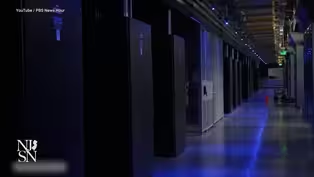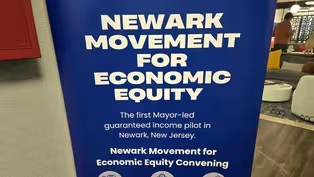NJ Spotlight News
How to spend NJ's share of opioid settlement funds?
Clip: 6/20/2025 | 4m 51sVideo has Closed Captions
Interview: Lilo H. Stainton, health care writer, NJ Spotlight News
New Jersey is gearing up to receive $125 million as part of an opioid settlement agreement reached this week with Purdue Pharma and its owners, the Sackler family, for their role in deceptive marketing of the highly addictive painkiller OxyContin.
Problems playing video? | Closed Captioning Feedback
Problems playing video? | Closed Captioning Feedback
NJ Spotlight News is a local public television program presented by THIRTEEN PBS
NJ Spotlight News
How to spend NJ's share of opioid settlement funds?
Clip: 6/20/2025 | 4m 51sVideo has Closed Captions
New Jersey is gearing up to receive $125 million as part of an opioid settlement agreement reached this week with Purdue Pharma and its owners, the Sackler family, for their role in deceptive marketing of the highly addictive painkiller OxyContin.
Problems playing video? | Closed Captioning Feedback
How to Watch NJ Spotlight News
NJ Spotlight News is available to stream on pbs.org and the free PBS App, available on iPhone, Apple TV, Android TV, Android smartphones, Amazon Fire TV, Amazon Fire Tablet, Roku, Samsung Smart TV, and Vizio.
Providing Support for PBS.org
Learn Moreabout PBS online sponsorshipWell, as we reported on Monday, New Jersey is gearing up to receive about $125 million as part of an opioid settlement deal with Purdue Pharma and its owners.
If you add it all up, the state has been awarded more than $1,000,000,000 total in settlement funds related to the deadly public health crisis.
And a panel of experts who are part of what's called New Jersey's Opioid Recovery and Remediation Advisory Council, just recently released a plan on how to spend that money.
It's a 108 page report that details which programs and parts of the state would benefit most.
Our health care writer Lilo Stainton, joins us with more.
Lilo obviously coming off of another settlement agreement, this time with Purdue.
The state's pot of money is growing.
What are experts recommending for how the state use this money?
Yeah.
Experts are largely on the same page, whether you're talking to people, advocating for how the local money is spent or the state money.
And a lot of that is about it's primarily about housing.
It's expanding access to harm reduction strategies, which are distributing Narcan, clean needles, things like that, which bring down deaths.
Getting people on, getting getting providers, treatment providers trained in best practices.
There lots of new great program ways and methods out there, but they don't always filter down to the people doing the work.
And so this would sort of expedite that and then sort of supporting these wraparound services so that people who need basic things like food or transportation could also get help with those things.
So a lot of it is about meeting core needs, but it's also really about doing what the clinical best practice is for treating these diseases.
And that includes, you know, outpatient use of of buprenorphine and other medications that have methadone that have had really high success rates.
So how is this money being distributed.
We're talking about $1.3 billion over 15 years.
That's including this latest amount just announced yesterday.
Is it going to nonprofits?
Is it going at the local level, the state level?
How does that work?
Right.
So there are two pots of money the state oversees half and the other half is being distributed by the 21 county governments and about 250 local municipalities or towns that opted into the settlement.
And they were given access to the settlement either because of their size or their location or because they wanted in.
And they're essentially communities that have been particularly hard hit by the epidemic.
So the hope is among advocates who are involved in this is that the money will go as directly as possible to the people who are doing the work on the front lines.
And it's interesting, in the advocacy community, there's a lot of talk about, you know, making sure that their their colleagues get access to this information and know this money is out there and know that it is for them.
So, you know, there are grants going out all the time through the state.
So this money is going out the door already.
But as we know, it's a huge pot and there's many years to come still.
It is.
I mean, when you look at it as a whole, but when you think about the number of deaths, if it's not getting in to the right hands, you have to wonder if justice is served at all no matter how much money there is.
Is there a way, very quickly, that this is can be tracked to make sure that the money is getting to those who've been harmed?
That's a great question.
I mean, the state did not opt to give it directly to people who lost loved ones.
However, oversight of the programs that they are funding is somewhat limited.
Shout out to the state comptroller though, who is looking into some of at least one community that has, you know, that has risen to their to their attention.
Irvington.
But, you know, and that's caught up in court.
So there's limited oversight.
But, you know, advocates are really hoping that that they can sort of keep their eyes out and just encourage people to do the right thing and invest in the practices that they know will make a difference and save lives.
All right.
Lilo Stainton for us, you can read all of those reporting on this and other stories on our website at NJSpotlightNews.org.
Lilo, thanks.
Thank you Bri.
NJ lawmakers target energy-hungry AI data centers
Video has Closed Captions
Clip: 6/20/2025 | 5m 5s | As energy costs rise, data centers singled out for using huge amounts of electricity (5m 5s)
Leaders, advocates praise Newark’s Guaranteed Income program
Video has Closed Captions
Clip: 6/17/2025 | 3m 44s | Program beneficiaries save more and were less likely to be evicted (3m 44s)
Providing Support for PBS.org
Learn Moreabout PBS online sponsorship
- News and Public Affairs

Top journalists deliver compelling original analysis of the hour's headlines.

- News and Public Affairs

FRONTLINE is investigative journalism that questions, explains and changes our world.












Support for PBS provided by:
NJ Spotlight News is a local public television program presented by THIRTEEN PBS

